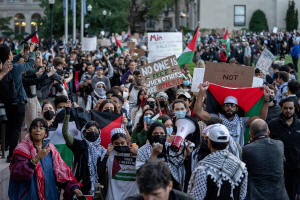Fearful and grieving, Gen Z Americans clash over Israel conflict
 Send a link to a friend
Send a link to a friend
 [October 18, 2023]
By Gabriella Borter and Joseph Ax [October 18, 2023]
By Gabriella Borter and Joseph Ax
(Reuters) - Kevin Khadavi, a Jewish student at Stanford University, got
a call from his grandmother last week urging him not to wear his Star of
David necklace around campus, for fear his display of Jewish identity
could make him a target.
"Don't make yourself obvious," she texted him afterwards.
At Washington University in St. Louis, a Muslim student named Haniah
decided to wear earrings in the shape of historic Palestine to express
support for Palestinians. A fellow student spotted them and railed at
her for nearly three minutes, calling her a terrorist while she fought
back tears.
"If I cried, that would be a win for them," she said.
In the days since Hamas launched deadly attacks in Israel, young people
in the U.S. have been gripped by fear, anger and grief as they process
the violence unfolding halfway around the world and feel the divisive
effects in their own social circles.
In interviews with more than a dozen Jewish, Palestinian and other
members of Generation Z – those born after 1996 – many expressed
frustration that nuanced opinions have been drowned out. Social media,
which many say has helped advance their understanding of events, has
also exhausted them and alienated them from friends.
Polling shows this generation is more skeptical of Israeli policy toward
Palestinians than older Americans are. But even within their cohort, the
range of opinions varies immensely – from those who justified Hamas'
actions as a response to decades of Israeli oppression, to those who
cast any pro-Palestinian protesters as supporters of terrorism, and even
more who lament that innocent civilians on both sides are caught in a
crossfire of failed leadership.

They've struggled, in person and online, with when and how to express
their views about a conflict that has defied peaceful reconciliation for
decades, interviews showed.
CONFLICTS ON CAMPUS
For Haniah, who asked to conceal her last name out of safety concerns,
wearing her earrings felt like "the bare minimum" she could do to show
support for Palestinians, who are currently under siege in Gaza as the
Israeli government seeks to destroy Hamas leadership. But the campus
confrontation made her doubt whether it was safe to engage with
pro-Israel peers at the moment.
"It's a horrible situation on campus, honestly," she said.
Meanwhile, many Jewish students have voiced fears in the last week, as
they perceive some classmates to be supporting Hamas' attack on Israelis
by rallying around the Palestinian cause.
Yonatan Manor, president of Boston University Students for Israel, said
failure to denounce Hamas was akin to supporting Nazis.
"This is the biggest wave of antisemitism we've seen since the
Holocaust," the 20-year-old said.
Younger Americans are much less likely than older generations to support
Israel. A Reuters/Ipsos poll conducted on Thursday and Friday showed 34%
of Americans aged 18-39 believe Hamas is responsible for the conflict,
while 58% of Americans 40 and up believe so.
Support for Israel has grown among all Americans since 2014, when
clashes between Israel and Hamas led to thousands of deaths, the vast
majority Palestinians. But it has grown less among younger people, with
only about 20% now expressing support for Israel compared to 14% in
2014; the share of older Americans backing Israel has nearly doubled to
56% from 28% in 2014, the polling showed.
For many Jewish students, the outpouring of support for Palestinians in
the last week feels like an attack on their right to exist, they say.
Others say they sympathize with Palestinians but argue that the horror
of Hamas' attacks should trump any discussion of the broader
Israeli-Palestinian conflict.
"Those conversations should happen – just not right now," Manor said.
"Now is a time for solidarity with Jewish people."

But other young people said such thinking compounds a longstanding
pattern of ignoring the plight of Palestinians. Several students
expressed frustration at western institutions, from the U.S. government
to their own schools, for supporting Israel unequivocally.
Christopher Iacovetti, a PhD student at the University of Chicago,
described what he called a double standard, saying that pro-Palestinian
activists are urged to denounce Hamas while Israel supporters are rarely
asked to answer for Israel's attacks on Palestinians.
[to top of second column]
|

Pro-Palestinian students take part in a protest in support of the
Palestinians amid the ongoing conflict in Gaza, at Columbia
University in New York City, U.S., October 12, 2023. REUTERS/Jeenah
Moon/File Photo

He likened Hamas' attack to liberation movements like Nat Turner's
1831 rebellion - in which enslaved Black people killed dozens of
white Virginians - and argued that oppressed people are justified in
resisting, even if individual acts are atrocious.
"There's a difference between war aims and war conduct," he said.
'WE BOTH FEEL PAIN'
As the Middle East discourse has launched campus protests, it has
also engulfed students' online world. Most students interviewed had
taken to social media to express their views - and to evaluate their
peers' opinions.
Many described feeling pressure to post something publicly. But they
also worried they would inevitably offend someone and possibly get
blocked, publicly shamed or consumed in an antagonistic political
debate. Several described social media as draining in the last week.
On rare occasions, online discussions have been productive, students
said. Hadia Khatri, a Muslim student at Washington University in St.
Louis, said she got into an Instagram conversation with a student in
her dorm who supported Israel, and they managed to agree that both
sides needed better leadership.
Some said social media forced the oversimplification of what should
be a more nuanced conversation, leading to the belief that people
are completely polarized.
The loudest voices have been the most extreme, many said, making
productive conversation virtually impossible.
The pressure to align fully with one side has been particularly
wrenching for some Jews who are critical of Israel's historic stance
toward Palestinians.
As images of civilians dying under Israeli siege in Gaza have
emerged, some have openly joined calls for Israel to end its
blockade, sometimes risking blowback from family and friends.
Jewish Voice for Peace, which advocates for Palestinian
independence, has joined pro-Palestinian campus demonstrations. One
member, a Middle Eastern Jewish student at Barnard College who
requested anonymity for safety concerns, said the organization's
ethos underscores the conflict's complexity.
"It's convenient to lean into the comfort of 'sides' and perfect
labels at times like these, yet the reality is nuanced and
uncertain," she said in an email.

Raffi Ivker, a Jewish student at George Washington University, said
he believed neither side "has clean hands." Israel's turn to the
right in recent years, he said, has made achieving peace less
likely, and he expressed concern that a ground invasion of Gaza
would result in more civilian deaths.
But he also was disturbed seeing pro-Palestinian protests in the
wake of the attacks and said the participants appeared to be
"glorifying or excusing" the murder of Israelis, which he called
sickening.
Josh Joffe, a 23-year-old working at a healthcare lobbying firm in
Washington, D.C., said he had experienced "cognitive dissonance" as
a Jew who was taught to revere Israel, but who had come to view
Israel as bearing much of the fault in the conflict.
He has only discussed that view with close friends, believing it
could alienate people who are "really emotionally caught up in this
right now."
Still, some students said those raw feelings could help dispel
tension and establish common ground.
Khadavi, the Stanford student, was leaving class last week when he
ran into a Palestinian classmate. The two hugged and told each other
they were thinking of each other's families.
"Emotion absolutely plays a role in this - not as a blinding force
but as an illuminating force, to try to bridge divides, to say that
we both feel pain when people are killed," he said.
(Reporting by Joseph Ax in New York and Gabriella Borter in
Washington; Additional reporting by Jason Lange; Editing by Paul
Thomasch and Howard Goller)
[© 2023 Thomson Reuters. All rights
reserved.]This material
may not be published, broadcast, rewritten or redistributed.
Thompson Reuters is solely responsible for this content. |